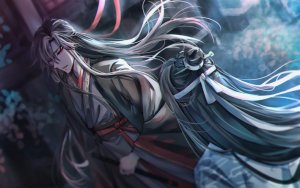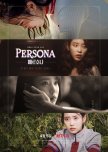Cette critique peut contenir des spoilers
The deeper you get, the more interesting it is.
I was a little confused about what the underlying message behind all the four short films was... so I did a little search for it and then I found some interesting stuff...
The first film, Love Set, is basically a tennis match with IU's father's marriage at stake. But in reality, it's a power struggle between the two women. They hardly pay any attention to IU's father and IU's supposed 'boyfriend' throughout the course of the match, making it more about them and their fight for dominance over each other with the father's 'marriage' as an excuse to do so. It brings out the proud side of human nature... Love Set basically portrays how we deal with conflict in our life.
But another theory is that IU and Doona (the English teacher) go way back in time and have had a past before Doona and IU's father even met.
Collector is a short film about a 'Kumiho' (a nine-tailed fox that turns into a beautiful woman who seduces men and eats their liver or heart). Collector shows the dominance of women in society and portrays the darker side of woman empowerment. In the film, IU uses her sexuality to her advantage and seduces Beak Jeong U until he's so in love with her that he's willing to rip out his heart and give it to her. This shows the manipulative side of women that society doesn't really talk about.
Kiss Burn, the lightest of all four films, is a short depiction on youth, friendship, loyalty, mischief, oppression and rebellion. IU plays the role of a loyal friend who helps Hye Bok take revenge on her oppressive father. IU and Hye Bok try various methods to take revenge on Hye Bok's father and find amusement even in the smallest of things which shows the innocence of childhood. As the film progresses, it's clear that IU and Hye Bok have a strong bond of friendship and admiration for each other. As an act of rebellion, IU encourages Hye Bok to smoke a cigarette which results in the fire in the chicken coop. During the incident, we can see a chicken escaping the coop with its tail on fire which, in the end, leads to the massive forest fire we see in the end of the film. This shows that the Youth neglect the bigger picture of what their actions do to society.
Walking at Night is a take on depression. In the film, IU, who is dead, visits her boyfriend in a dream and they talk about things they didn't get to talk about when IU was alive. IU confesses that she committed suicide because she felt lonely. Her boyfriend hardly keeps his tears in, partly blaming himself for what happened despite IU's constant reminder that her death wasn't his fault. IU confesses that he did help her, but the loneliness she felt when she was with others overpowered the feelings her boyfriend made her feel. Then the two former lovers go on to talk about how they'll be eventually forgotten and how life is uncertain for death is not the end.
I summarised what I understood from reading two-three articles explaining each film because I was jobless and really curious. I initially gave this anthology an 8/10 but after deciphering what it truly conveys, I'm changing it to a 9/10 because it genuinely impressed me. IU's acting was really good but so was Park Hae Soo's in Collector. He stood out to me the most among all four shorts.
I wouldn't rewatch it, but I'd say if you're a commuter, you just found yourself two days worth of entertainment.
The first film, Love Set, is basically a tennis match with IU's father's marriage at stake. But in reality, it's a power struggle between the two women. They hardly pay any attention to IU's father and IU's supposed 'boyfriend' throughout the course of the match, making it more about them and their fight for dominance over each other with the father's 'marriage' as an excuse to do so. It brings out the proud side of human nature... Love Set basically portrays how we deal with conflict in our life.
But another theory is that IU and Doona (the English teacher) go way back in time and have had a past before Doona and IU's father even met.
Collector is a short film about a 'Kumiho' (a nine-tailed fox that turns into a beautiful woman who seduces men and eats their liver or heart). Collector shows the dominance of women in society and portrays the darker side of woman empowerment. In the film, IU uses her sexuality to her advantage and seduces Beak Jeong U until he's so in love with her that he's willing to rip out his heart and give it to her. This shows the manipulative side of women that society doesn't really talk about.
Kiss Burn, the lightest of all four films, is a short depiction on youth, friendship, loyalty, mischief, oppression and rebellion. IU plays the role of a loyal friend who helps Hye Bok take revenge on her oppressive father. IU and Hye Bok try various methods to take revenge on Hye Bok's father and find amusement even in the smallest of things which shows the innocence of childhood. As the film progresses, it's clear that IU and Hye Bok have a strong bond of friendship and admiration for each other. As an act of rebellion, IU encourages Hye Bok to smoke a cigarette which results in the fire in the chicken coop. During the incident, we can see a chicken escaping the coop with its tail on fire which, in the end, leads to the massive forest fire we see in the end of the film. This shows that the Youth neglect the bigger picture of what their actions do to society.
Walking at Night is a take on depression. In the film, IU, who is dead, visits her boyfriend in a dream and they talk about things they didn't get to talk about when IU was alive. IU confesses that she committed suicide because she felt lonely. Her boyfriend hardly keeps his tears in, partly blaming himself for what happened despite IU's constant reminder that her death wasn't his fault. IU confesses that he did help her, but the loneliness she felt when she was with others overpowered the feelings her boyfriend made her feel. Then the two former lovers go on to talk about how they'll be eventually forgotten and how life is uncertain for death is not the end.
I summarised what I understood from reading two-three articles explaining each film because I was jobless and really curious. I initially gave this anthology an 8/10 but after deciphering what it truly conveys, I'm changing it to a 9/10 because it genuinely impressed me. IU's acting was really good but so was Park Hae Soo's in Collector. He stood out to me the most among all four shorts.
I wouldn't rewatch it, but I'd say if you're a commuter, you just found yourself two days worth of entertainment.
Cet avis était-il utile?
























